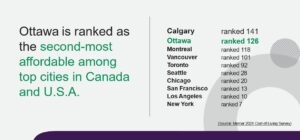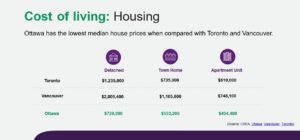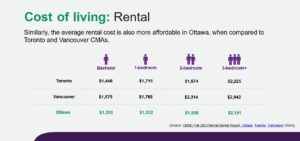As tech professionals weigh where to grow their careers, they’re not just asking, “What does the job pay?” They’re asking, “What does the job make possible?” Cost of living, disposable income, housing prices, and lifestyle flexibility all factor into this equation.
While Ottawa may offer slightly lower base salaries than Toronto or Vancouver in Canada and New York and San Francisco in the United States, Canada’s capital’s significantly lower cost of living, stable job market, and high quality of life often give professionals more in return.
Overall, where does Ottawa stand in terms of cost of living? Well, when you compare affordability in major North American cities (lower ranking = less affordability), Ottawa stands as the city with the second-lowest cost of living.

Image: Affordability in Major North American cities according to Mercer’s 2024 cost-of-living data
Let’s see how it stacks up when we compare different aspects of living in a city:
How Much Do Tech Jobs Pay in Ottawa?
Ottawa’s tech salaries remain competitive across high-demand roles like software engineering, data analytics, DevOps, and cybersecurity. Here’s a snapshot of average base salaries in 2025:
- Software Developer: $85,000 – $110,000 (CAD)
- Data Analyst: $70,000 – $90,000 (CAD)
- DevOps Engineer / Cybersecurity Specialist: $95,000 – $120,000 (CAD)
- Product Manager: $95,000 – $115,000 (CAD)
Source: PayScale
While salaries may be higher in Toronto or U.S. markets like San Francisco or Seattle, Ottawa’s cost advantages often result in a stronger financial footing.
Want to explore what tech roles in Ottawa are offering right now? Browse current listings on Invest Ottawa’s Global Talent Program Job Board to find your next opportunity.
Salary Comparison in Ottawa vs. Other Canadian Cities
According to the Robert Half 2025 Canada Technology Salary Guide, Ottawa continues to offer competitive salaries for a wide range of technical positions. While wages in Toronto and Vancouver are generally higher, the differences often narrow when adjusted for cost of living—especially in housing and transit.
Here’s how average starting salaries (in CAD) compare across three Canadian tech hubs:
| Position | Ottawa | Toronto | Vancouver |
| CRM Developer | $90,000 | $100,000 | $98,000 |
| Cybersecurity Analyst | $100,000 | $110,000 | $108,000 |
| Data Engineer | $110,000 | $120,000 | $118,000 |
| IT Director | $160,000 | $175,000 | $170,000 |
| Machine Learning Engineer | $120,000 | $130,000 | $128,000 |
| Software Engineer/Developer | $95,000 | $105,000 | $102,000 |
| Telecommunications Specialist | $85,000 | $95,000 | $93,000 |
| Web Developer | $75,000 | $85,000 | $83,000 |
Note: These are estimated base starting salaries for 2025 and can vary based on certifications, years of experience, and company size.
While Ottawa offers salaries approximately 8–12% lower on average than Toronto and Vancouver, professionals working in the capital benefit from significantly lower housing costs, reduced commute times, and improved work-life balance.
Salary Comparison in Ottawa vs. American Tech Hubs
New York
$65,000 – $116,000 USD ($89,000 – $159,000 CAD)
-
- Depending on years of experience, role, and company
Source: Glassdoor
San Francisco Bay Area
$83,000 – $148,000 USD ($114,000 – $203,000 CAD)
-
- Depending on years of experience, role, and company
Source: Glassdoor
Cost of Living in Ottawa vs. Major Cities
Beyond housing, Ottawa’s day-to-day living expenses are significantly more manageable than those in Toronto, Vancouver, or New York- allowing tech professionals to stretch their income further and improve their overall quality of life.
Here’s how the capital stacks up, according to May 2025 data from Numbeo:
Groceries
- A litre of milk: ~$3.13 in Ottawa vs. $3.98 in Toronto
- A dozen eggs: $4.83 in Ottawa vs. $5.60 in Vancouver and $8.73 in New York
- 1 kg of chicken breast: $18.08 in Ottawa vs. $19.67 in Vancouver and $21.25 in New York
*All prices in CAD
Overall, groceries in Ottawa tend to be slightly cheaper compared to Toronto, Vancouver, and New York.
Public Transit
- Ottawa (OC Transpo): Monthly adult pass — $135 CAD
- Toronto (TTC): Monthly pass — $156 CAD
- Vancouver (TransLink): Monthly 2-zone pass — $143.50 CAD
- New York (MTA): Monthly Metrocard – $132 USD ($181 CAD)
- San Francisco Bay Area (SFMTA): Clipper Pass – $104 USD ($142 CAD)
Ottawa’s lower transit costs can add up to around $100-$250/year in savings for regular commuters, and far more for families purchasing multiple passes.
Utilities
Monthly utility bills (electricity, heating, cooling, water, garbage) for an 85 m² apartment:
- Ottawa: ~$180/month
- Toronto: ~$210/month
- Vancouver: ~$200/month
- New York: ~$255/month
- San Francisco: ~$314/month
*All prices in CAD
Source: Numbeo
Ottawa’s lower energy consumption costs are partly due to newer residential builds and less extreme climate variability.
Childcare
Full-time private preschool for one child:
- Ottawa: ~$1,050/month
- Toronto: ~$1,300/month
- Vancouver: ~$1,250/month
- New York: ~$4,343/month
- San Francisco: ~$3,939/month
*All prices in CAD
Source: Numbeo
Thanks to the Canada-Wide Early Learning and Child Care (CWELCC) system, fees in Ottawa are gradually decreasing. Many licensed providers already participate in the program, reducing costs by as much as 50% from pre-2022 levels.
These differences add up quickly, whether you’re single, partnered, or raising a family. Combined with Ottawa’s lower property taxes and access to free cultural events and green space, the city offers better cost efficiency without compromising amenities or career options.
Affordability and Housing Outlook
Ottawa’s more accessible real estate market means that professionals can often buy property earlier than their peers in other cities. In fact, many tech workers here make the transition from renting to ownership within 3–5 years of relocating.
According to early 2025 benchmark figures:
- Ottawa: $626,200
- Toronto: $1,009,400
- Vancouver: $1,205,800
Source: WOWA.ca
- New York: $854,600 USD ($1,172,200 CAD)
- San Francisco Bay Area: $1,310,200 USD ($1,797,000 CAD)
Source: Realtor.com, Zillow
Ottawa also benefits from lower property taxes and development fees, easing long-term costs.

Image: Housing Cost in Ottawa vs Toronto vs Vancouver (Source: CREA: Ottawa, Vancouver, Toronto)

Image: Rental Cost in Ottawa vs Toronto vs Vancouver (Source: CREA: Ottawa, Vancouver, Toronto)
Taxes and Take-Home Pay Differences
Ontario’s provincial tax rates are middle-of-the-road compared to provinces like Alberta (lowest) and Quebec (highest). For a tech worker earning $100,000:
- Ontario (Ottawa): ~$26,500 in taxes
- Quebec (Montreal): ~$30,000 in taxes
- British Columbia (Vancouver): ~$25,700 in taxes
- Alberta (Calgary): ~$23,700 in taxes
Source: EY Tax calculators & rates
- New York (New York) & California (San Francisco): ~$29,000 in taxes
Source: SmartAsset
Municipal property taxes in Ottawa are also generally lower in real-dollar terms than in Toronto. While the residential tax rate in Ottawa is 1.196%, compared to 0.715% in Toronto, Ottawa’s much lower home prices mean most residents pay less in actual tax.
For example, a homeowner in Ottawa with a benchmark home valued at $626,200 would pay roughly $7,486 annually in municipal taxes. In Toronto, despite the lower rate, a homeowner with a $1,009,400 benchmark property would still pay around $7,220—only slightly less, but on a significantly more expensive home.
So while Alberta continues to offer the lowest overall tax burden, Ottawa provides a compelling middle ground: affordable housing, stable services, and manageable property taxes.
Why Ottawa Delivers More Than Just a Paycheque
The numbers tell a clear story: Ottawa may not top the charts in base salary, but it outperforms many major North American cities when it comes to financial sustainability, homeownership access, and overall quality of life.
While most North American cities offer a dynamic and robust lifestyle with plenty of opportunities, Ottawa comes as a major tech hub with comparatively lower housing costs, lower commuting stress, and a vibrant tech ecosystem, offering professionals the space and savings to build long-term stability.
Thinking about relocating or comparing offers? Choose Ottawa!
→ Join our talent pool to get matched with top employers in the region.
→ Or, sign up for our newsletter to receive regular updates on Ottawa tech jobs, hiring trends, and exclusive networking events.






